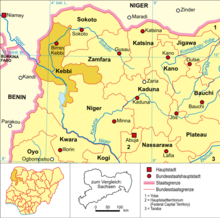Kebbi
| Kebbi | |
|---|---|
| Basic data | |
| Capital : | Birnin Kebbi |
| founded: | August 27, 1991 |
| Governor : | Adamu Aliero |
| ISO 3166-2 : | NG-KE |
| surface | |
| Area : | 36,800 km² |
| Rank in Nigeria: | 10 |
| population | |
| Residents : | 4,440,000 (2016) |
| Population density : | 121 inhabitants / km² (2016) |
| Rank in Nigeria: | 22nd |
Kebbi is a federal state in the northwest of the West African country Nigeria with the capital Birnin Kebbi , which is also the largest city in the state with 108,172 inhabitants (2005).
geography
The state is located in the northwest of the country and borders the state of Sokoto to the north, the state of Niger to the south , the Republic of Niger to the northwest , Benin to the southwest and the state of Zamfara to the east . In the south of the state, large parts of the Kainji National Park and the wetland of the Foge Islands extend , which in 2008 was included in the list of internationally significant wetlands of the Ramsar Convention .
history
According to a newer theory of the Bayreuth professor Dierk Lange, Kebbi was already around 600 BC. Founded by refugees from the collapsing Assyrian Empire . However, according to more conventional historiography, the Kingdom of Kebbi or Kebbi Emirate did not emerge as a province of the Songhai Empire until the 15th century . The founder of the Kebbi emirate was Muhammadu Kanta, who supposedly rose to king in 1516. Kebbi was one of the seven Banza states, called Banza Bakwai in Hausa . Kanta subjugated the kingdom of Yauri and made it tributary. Around 1700 the capital of the empire was moved from Surame to Birnin Kebbi by King Tomo . At the same time the empire experienced its greatest expansion and prosperity. It stretched for more than 500 km from Ader in the north to Borgu in the south. A dramatic turning point occurred in 1805 when the future Emir of Gwandu , the brother of Usman dan Fodio Abdullahi, took control of the north of the empire as part of the Fulbe jihad . The king of Kebbi fled to Argungu and made this settlement the new capital of the empire. The empire was to exist as an independent state until 1902, after which it was integrated into the British colony of Northern Nigeria .
The state was formed on August 27, 1991 from part of the state of Sokoto . The first administrator was Patrick Aziza between August 28, 1991 and January 1992. Adamu Aliero has been the current governor since May 29, 1999 .
population
The state of Kebbi is mainly populated by the Haussa people, there are also members of the Bussawa , Dukawa , Kambari and Kamuku ethnic groups . The dominant religion is Sunni Islam . Islamic law, the Sharia, applies in the state of Kebbi . It also acts as the main source of legislation. All laws in the state must comply with Sharia law.
Governors and administrators
- Patrick Aziza (administrator 1991–1992)
- Abubakr Musa (Governor 1992–1993)
- ST Bello (administrator 1993–1996)
- John Ubah (Administrator 1996-1998)
- Samaila Chama (Administrator 1998–1999)
administration
The state is divided into 21 Local Government Areas . These are: Aleiro, Arewa-Sandi, Argungu, Augie, Bagudo, Birnin-Kebbi, Bunza, Dandi, Fakai, Gwandu, Jega, Kalgo, Koko-Besse, Maiyama, Ngaski, Sakaba, Shanga, Suru, Wasagu-Danko, Yauri and Zuru.
economy
The agriculture is the main industry in Kebbi. The fertile soil allows the cultivation of millet , corn , cassava , potatoes , rice , beans , onions , vegetables , wheat , soybeans , ginger , sugar cane , peanuts , tobacco , mango , guava and papaya . The fishing industry is important.
The state's natural resources include limestone , salt , clay and gypsum .
literature
- Perey G. Harris: Sokoto Provincial Gazetteer. Sokoto 1938 (archive document, Sokoto; copy at the University of Bayreuth).
- Dierk Lange: The early kebbi and Mali. In: Journal of the German Oriental Society. 141, 1991, pp. 139-166.
- Dierk Lange: An Assyrian successor state in West Africa: The ancestral kings of Kebbi as ancient Near Eastern rulers. (PDF; 530 kB). In: Anthropos. 104, 2, 2009, pp. 359-382.
- Oladimeji Aborisade, Robert J. Mundt: Politics in Nigeria. Longman, New York 2002, ISBN 0-321-08561-2 .
proof
- ↑ Nigeria: States & Agglomerations - Population Statistics, Maps, Graphics, Weather and Web Information. Retrieved February 7, 2018 .
- ^ The Annotated Ramsar List: Nigeria. ( Memento from October 12, 2013 in the Internet Archive )
- ^ Dierk Lange: An Assyrian successor state in West Africa: The ancestral kings of Kebbi as ancient Near Eastern rulers. (PDF; 530 kB). In: Anthropos. 104, 2, 2009, pp. 359-382.
- ↑ Website of the state of Kebbi (English)
- ↑ Birnin Kebbi on Britannica online (English)
- ↑ The history of the Fulani jihad on Britannica online (English)
- ^ C-GIDD (Canback Global Income Distribution Database). Canback Dangel, accessed August 20, 2008 .

